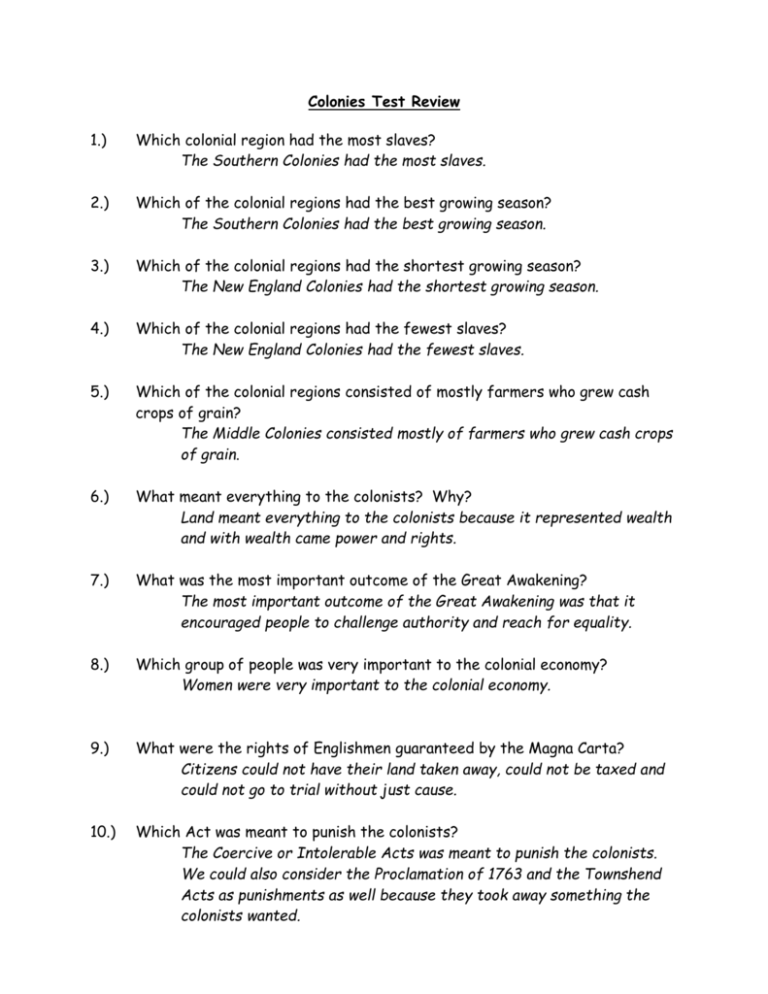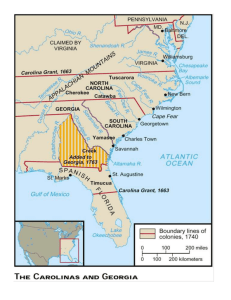Colonies Test Review
advertisement

Colonies Test Review 1.) Which colonial region had the most slaves? The Southern Colonies had the most slaves. 2.) Which of the colonial regions had the best growing season? The Southern Colonies had the best growing season. 3.) Which of the colonial regions had the shortest growing season? The New England Colonies had the shortest growing season. 4.) Which of the colonial regions had the fewest slaves? The New England Colonies had the fewest slaves. 5.) Which of the colonial regions consisted of mostly farmers who grew cash crops of grain? The Middle Colonies consisted mostly of farmers who grew cash crops of grain. 6.) What meant everything to the colonists? Why? Land meant everything to the colonists because it represented wealth and with wealth came power and rights. 7.) What was the most important outcome of the Great Awakening? The most important outcome of the Great Awakening was that it encouraged people to challenge authority and reach for equality. 8.) Which group of people was very important to the colonial economy? Women were very important to the colonial economy. 9.) What were the rights of Englishmen guaranteed by the Magna Carta? Citizens could not have their land taken away, could not be taxed and could not go to trial without just cause. 10.) Which Act was meant to punish the colonists? The Coercive or Intolerable Acts was meant to punish the colonists. We could also consider the Proclamation of 1763 and the Townshend Acts as punishments as well because they took away something the colonists wanted. 11.) Which two Acts did Britain repeal? Britain repealed the Stamp Act and the Townshend Acts. 12.) What did Britain learn from Pontiac’s Rebellion? Britain learned that it needed to keep the colonists out of the Native American lands in the Ohio River Valley because it was too hard to protect them and maintain positive relations with the Native Americans. What was responsible for causing the French and Indian War? Colonists moving into the Ohio River Valley, stealing Native American lands and stealing trade away from the French led to the start of the French and Indian War. What was the first document to grant freedoms to British Citizens? The first document to grant freedoms to British Citizens was the Magna Carta which was signed in 1215. 13.) 14.) 15.) Which Act said that colonists could not move past the Appalachian Mountains? The Proclamation of 1763 said that colonists could not move past the Appalachian Mountains. 16.) What did colonists use in an effort to get the King and Parliament to repeal the taxes they had passed? Explain. Colonists used protests in the form of boycotting to get the King and Parliament to repeal the taxes they had passed. By not purchasing the goods that England had taxed they weren’t collecting the revenue they needed and therefore they were not effective anyway. What law angered colonists who had fought to win land in the fertile Ohio River Valley? The Proclamation of 1763 angered colonists because they could not settle west of the Appalachian Mountains. How were the battles of Lexington and Concord described? The battles of Lexington and Concord can be described as “the shot heard ‘round the world” as it signaled the start of the War. What organization was formed to keep colonists informed about what was happening in the other colonies? The Committees of Correspondence kept the colonists informed about what was happening around the colonies. 17.) 18.) 19.) 20.) What was the second document to guarantee rights to British citizens? What did it guarantee? The second document to guarantee rights to British citizens was the English Bill of Rights. The English Bill of Rights guaranteed that citizens had the right to free elections. 21.) Who fought in the French and Indian War? Did ordinary citizens join the fight or was it just the British and French regular? Explain. The British and French with their Native American allies fought in the French and Indian War. The British and French regulars were joined by ordinary citizens in the war. Name one of the secret societies that colonists formed to assist with organization of protests. The secret societies that assisted the colonists with protesting were the Sons of Liberty and the Daughters of Liberty. 22.) 23.) 24.) 25.) In what way, or ways, did England’s policy of salutary neglect effect how the colonists felt about the King and Parliament? Salutary neglect had a negative impact on how the colonists felt about the King and Parliament. The colonies had been allowed to develop largely on their own and then the King decided he wanted to have more control over the colonies. This caused anger and confusion among the colonists and they felt that they were having their rights taken away. In what way, or ways, was the King and Parliament violating the colonists’ rights as English citizens? According to the Magna Carta and English Bill of Rights citizens could not have their land taken away, could not be taxed, and could not go to trial without just cause; they also had the right to free elections. Colonists could not elect members to parliament and they were being taxed heavily. King George III declared, “We must master them or totally leave them to themselves and treat them as aliens.” What did he mean by this? Was it effective? King George III meant that they either had to have complete control over the colonies or leave them as an independent country. This was not effective because their attempts to control the colonists lead to protests and conflict in the colonies.






